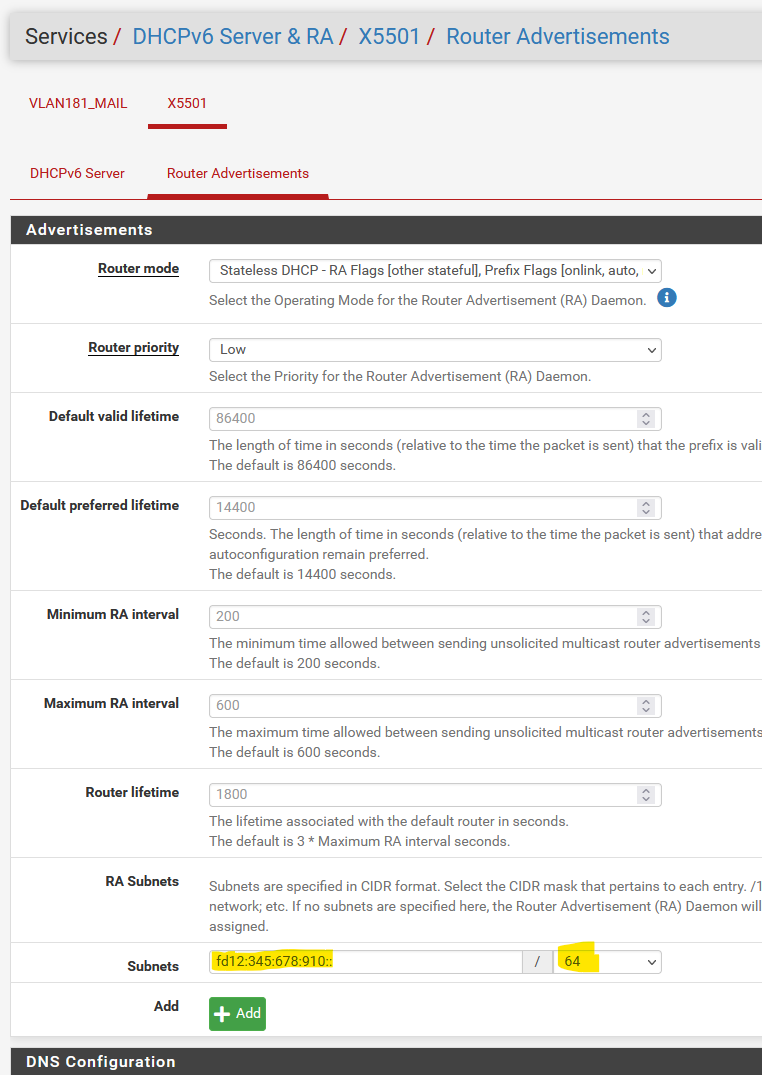Is it possible to have DHCPv6 assign both a local and a global address
-
My home network is dual stack. All devices get a local IPv6 address (fd00::/64) assigned either via manual assignment (servers) or DHCPv6.
Is it possible to also have DHCPv6 assign global addresses to the same set of clients (based on my global IPv6 /64 prefix) on the same network? If so how to configure it?
If it is possible, is it also possible to limit which clients get assigned global addresses?
Thanks.
-
@chrisjenk Use DHCPv6 with Track Interface for the GUA and Subnets on RA for ULA.

Change Router Mode to something usefull like assisted. -
@bob-dig
Of course, there's also SLAAC, instead of DHCPv6. DHCPv6 does not work with Android devices.
-
@bob-dig Thanks, but ideally I want to control the address that gets assigned, both local and global. Currently I can do that using the DUID for DHCPv6 for local addresses but if I switch to RA then I no longer have that control :-(
-
@chrisjenk So I found the best solution for me based on these suggestions (thanks!).
I have the DHCPv6 server set to hand out ULAs and have also set up some static mappings for key mobile devices.
fd00::xxxxxxxxxxx
I have the RA set to Assisted and I specify only the GUA address range there
2001:aaaa:bbbb:cccc::xxxxxxxxxxxxx
What I see now is that Apple devices (which do support DHCPv6) get 5 addresses:
fd00::<reservation> via DHCPv6
fd00::xxxxxxxxxxxx via SLAAC
fdbd:<psudo random> - some private address that Apple insists on generating/assigning but which is otherwise useless
2001:aaaa:bbbb:cccc::qqqqqqqqqqqqq - regular global address via SLAAC
2001:aaaa:bbbb:cccc::yyyyyyyyyyyyyyy - temporary global address via SLAACThis is fine for me since the device has a well known private address (which I want/need) plus it has full IPv6 Internet access etc.
Other devices that do not support DHCPv6 get the SLAAC addresses so they also work as expected (but without a well known address, which is fine as there are very few such devices in my network).
Problem solved!
-
@chrisjenk said in Is it possible to have DHCPv6 assign both a local and a global address:
@chrisjenk So I found the best solution for me based on these suggestions (thanks!).
Problem solved!Until your GUA-Prefix changes, then you have to manually reassign it. That is why I would do it the other way around, GUA via Track Interface (and DHCPv6) and ULA via RA.
But if your prefix is not dynamic then this doesn't apply to you.
-
@bob-dig Yes, what you say is true. Luckily my prefix(es) are not dynamic and I'd need to do quite a few changes to flip to what you suggest. I'll probably think about that as a longer-term project but for now this solution works for my specific use case.